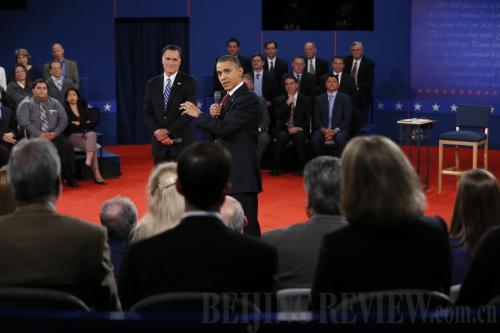|
 |
|
FACE-OFF: Barack Obama and Mitt Romney appear in their second debate at Hofstra University in Hempstead, New York, on October 16 (CFP) |
When asked about his response to the criticism and negative perception of China in the U.S. presidential debates, Hong Lei, China's Foreign Ministry spokesman, said China hopes that politicians in both the Democratic and Republican parties in the United States can view China's development in a fair and objective manner, and that the candidates can recognize the mutually beneficial nature of China-U.S. business relations.
Some American economic and foreign policy experts warned that aggressive actions against China might not result in a stronger American economy; instead, they may pit the two countries against each other.
Fred Hu, Chairman of Primavera Capital, a private equity group in Beijing, and former Greater China Chairman of Goldman Sachs, criticized that the U.S. general election has now gone after China as a punching bag. "The noises from the campaign trail are quite disconcerting," he said.
U.S.-based news agency Bloomberg asserted that threatening a trade war with China is a "terrible idea." The website listed "five worst ideas Romney and Obama agree on," one of which is: "We need to get tough on China."
The Bloomberg article came after the second debate, saying the renminbi is "a lot less undervalued than it used to be because the Chinese have been gradually letting it rise." It also pointed out that "the undervaluation makes our manufacturers less competitive, but it also makes the products we buy cheaper."
Complaints that the renminbi is deliberately undervalued to make Chinese exports cheaper are "out of date," said Sun of Tsinghua University.
Richard C. Bush III, Director of the Center for Northeast Asian Policy Studies at the Brookings Institution, wrote in his recent analysis, "In the worst case, a Romney decision to go to the brink with Beijing on the value of its currency would result in a mutually damaging trade war that slowed economic growth and increased unemployment in both countries and caused inflation and higher interest rates in the United States."
"Getting tough" is a posture, not a policy argument.
"Politicians of the Republican and Democratic parties don't have a clue that they have to deal with America's unemployment problem and real wage problem. So it's very convenient to blame someone else, like China," Steven S. Roach, a China expert with the Jackson Institute for Global Affairs in Yale University, told The Huffington Post.
On Obama's "achievement list" in his presidency, which he showcased repeatedly in the debates, he is proud of the trade disputes against China in the WTO and the creation of jobs for America.
One example is the case of tire tariffs. In 2009, the Obama administration approved high tariffs on tires imported from China to publish China for flooding the U.S. market with cheap wheels, a move that exemplified his efforts to pressure China to "play by the rules" and served as a plank in his larger platform of bringing jobs back to America.
However, a report released by the Peterson Institute of International Economics in April found that, even on very generous assumptions about the effectiveness of the tariffs, the measure probably cost U.S. consumers an annual $1.1 billion by 2011 and at best added 1,200 American jobs.
In the second presidential debate, even Obama admitted that some low-paid and low-tier jobs will never return to the United States.
Research shows that for every iPhone made in China, with a retail price of $178.96, the Chinese value added for labor and components is only about $6, and for each iPad made in China, which retails at $499, the value of the Chinese input is only around $8. Apple Inc. in California receives $150 in profits for each iPad sold.
Zhang Lijuan, a professor with the School of Economics, Shandong University, said American people have benefited hugely from the low cost of products made in China. Inexpensive Chinese goods have saved the average American family $500 a year, kept U.S. inflation low, and helped fuel the U.S. consumer economy by supplying affordable goods in the face of a recession.
C. Rose, an Obama campaign staffer, agreed that the United States benefits greatly from China's development. "I believe that if elected, President Obama will continue to respect the fact that China's economy is growing and is an important trade partner of America," she told Beijing Review.
The comments by Obama and Romney on China show that the two basically share the same ideas on developing the relationship with China and that U.S. policy on China is expected to be consistent no matter who is elected, said Ni Feng, Deputy Director of the Institute of American Studies at the Chinese Academy of Social Sciences.
"But a new characteristic of the development of the China-U.S. relationship is that domestic influences in both countries have been getting more significant in recent years," Ni said.
"The expanding engagement between the world's two largest economies will make ordinary people in both China and the United States have an increasingly strong sense of the impact of the China-U.S. relationship on their daily lives, although such an impact might not be totally positive," Ni noted.
(Reporting from New York City with additional reporting by Ding Ying in Beijing)
Email us at: dingying@bjreview.com | 